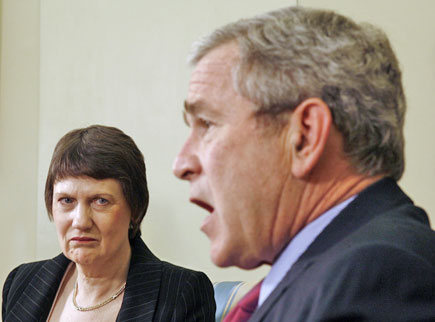 President George W. Bush has unofficially won his re-election bid defeating Democratic challenger Senator John Kerry. The election was close, no doubt, but it was by no means a re-run of the 2000 election drama. Because this time, Bush bagged a convincing victory by winning both Electoral College and Popular votes.
President George W. Bush has unofficially won his re-election bid defeating Democratic challenger Senator John Kerry. The election was close, no doubt, but it was by no means a re-run of the 2000 election drama. Because this time, Bush bagged a convincing victory by winning both Electoral College and Popular votes.The election which was heralded to be the most important in America's recent history ended up being an "as-usual-election", where Democrats and Republicans relied heavily on respective party's supporter-base for victory. This means, even though the election was thought to be an election where people will vote outside party lines based on issues like war on Iraq and the economy, at the end of the day people voted avidly in line with party affiliations.
Liberals, atheists, pro Choice groups, environmentalists, blacks, gay-lesbians, voted over-whelmingly for Democrats whereas Religious, Church going populations of the Central, Southern and Northern America voted overwhelmingly for the Republicans.
Although it was thought that the Iraq war and the state of the Economy and to certain extent terrorism will decide the outcome of the election, none of these issues seem to have any major impact. For example, exit polls showed that among the New Jersey voters, who lost most lives in the 9/11 attacks, 86% believed that another terrorist attack is coming but they still voted for Senator John Kerry. John Kerry had a landslide victory in New Jersey. This proves, terrorism did not actually prove to be a election winner for George W. Bush.
What actually impacted the most is moral issues, ethics and religion.
In America, "religiousness" has its own political dimension. Certain not-so-obvious issues having potentials to damage religion are considered as contentious religious issues that can win or lose votes in America.
At the forefront of these so called religious issues are Gay-Lesbian marriage, Pro Choice abortions and stem cell research.
Americans saw a spree of gay marriages in San Francisco and Massachusetts in the early part of the year 2004, and President George Bush was first to call for a constitutional ban on Gay-Lesbian marriages by defining marriage to be a sacred institution only to be nurtured by men and women.
Then there was the lingering issue of abortions, which is now a few decades old, without any visible indication of a settlement. President George Bush has always had assuring words for people who oppose abortions.
The issue of Stem-cell research, although not understood scientifically by average Americans, is very much understood politically by every Dick and Larry, thanks to the sermons from the Churches.
Senator John Kerry, a devout left leaning liberal in American politics, failed to redress the worry of Religious Americans about his stance on these highly contentious so called "moral issues".
He wavered and equivocated on numerous occasions regarding his stance on Gay Marriage and Abortions.
During his election debates, he repeatedly said he "personally" believes marriage is between a man and a woman, but then he assured gay-lesbian groups by stating that he is not going to impose his personal religious beliefs over somebody else. Now it appears, such politically correct and appeasing words aimed at soothing both gays and straights did not actually win votes among religious Americans.
The religious Americans perhaps took John Kerry's apparently politically correct words as direct indications for his support towards anti religious agendas such as Gay-lesbian marriage.
Same is true for the issue of abortion. John Kerry failed to replicate Bill Clinton's successful mode of addressing this issue.
Bill Clinton used to say that he will make abortion "rare, restrictive but available for those who has no choice but to go for it".
John Kerry took a more liberal stance in the debates over abortion by more or less admitting that he is pro-choice, and pro-abortions.
Regarding stem cell research, however, Kerry took the most daring and clear stance. He openly claimed that if elected president he will open up funding and legal avenues for stem-cell research. He did not stop there; he kept special seating arrangements for Michael J. Fox besides his wife in one of the presidential debates. Mr. Fox is a known advocate for the cause of stem cell research.
Kerry perhaps thought that at this very modern age, Americans must have become more liberal and accepting when it comes to scientific knowledge. May be he was right. Perhaps the 252 Electoral College votes that he got would have been much less had he not played to his liberal base.
But the fact of the moment is that in America there are more religious Christians than there are so called open minded, progressive liberals.
The Electoral College map will illustrate this fact the best. In the Electoral College map, entire Central America is Red, bearing the symbol of Republican victory, where as the two coasts along with certain North Eastern states are Blue. This means, the central, Southern and Northern American population, who are often called the “Bible Belt”, voted overwhelmingly Republican.
A CNN exit poll further showed that 56% of total voting population of Americans attends Church service at least once a month and among those Church attendees, almost 60% voted for George W. Bush.
Perhaps that was the end for Senator John Kerry's presidential aspirations.
In sum, this election showed to the Americans and the world that even in the year 2004, American people have appeal for religious issues much more than social, economic or foreign policy issues.
And showing disregard towards the cause of the religious population can be a smart choice for academics or the media, but certainly not for Presidential candidates, not even in America.






Tidak ada komentar:
Posting Komentar